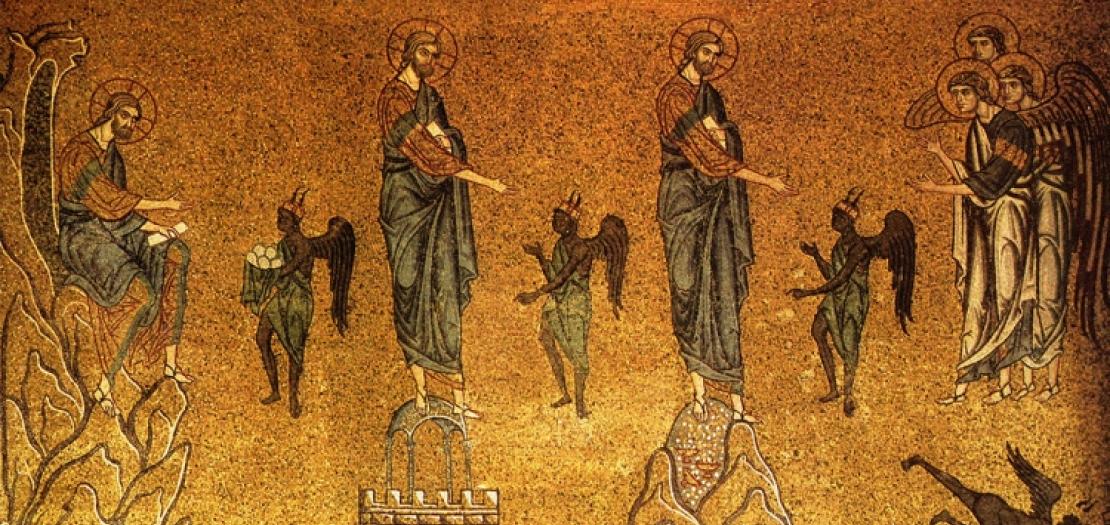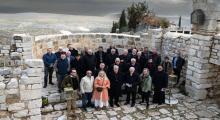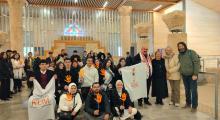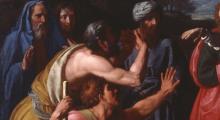Issued by the Catholic Center for Studies and Media - Jordan. Editor-in-chief Fr. Rif'at Bader - موقع أبونا abouna.org

Following is the text of the meditation by His Beatitude Cardinal Pierbattista Pizzaballa, Latin Patriarch of Jerusalem, for the first Sunday of Lent B, dated February 18, 2024:
The journey of Lent opens with the account of the temptations, told very succinctly in Mark's Gospel. Two verses only, according to which, immediately after his baptism by John, “the Spirit drove Jesus out into the desert, and he remained in the desert for forty days tempted by Satan. He was among wild beasts, and angels ministered to him." (Mark 1:12-13) Mark does not recount the content of the temptations, nor Jesus' dialogue with the tempter. The emphasis, as we shall see, is on something else.
However, the liturgy of the Word for this liturgical year adds to these few verses the following ones, which in themselves do not relate to the story of temptations, but may provide a further key to its interpretation. It is a Word already heard in the Third Sunday of Ordinary Time, the one that offers us Jesus' first words in his public life: "This is the time of fulfillment. The kingdom of God is at hand. Repent, and believe in the gospel.” (Mark 1:15)
Why this juxtaposition?
The beginning of Jesus' public life does not take place immediately after his Baptism; Jesus could have started from there, from that Word heard from the Father proclaiming his beloved Son. He could have started from there to bring this good news to everyone, to make the Father's voice resound in every place.
Instead, the Spirit drives Jesus into the desert, into the place of trial and temptation, because the Word heard from the Father needed to descend into his flesh, into his life.
We have said that Mark does not recount the content of the temptations, but he makes it clear that the whole period Jesus spent in the wilderness was a struggle, a continual trial. That is, a place where the Word heard comes into contact with life, with weakness, with a limitation: and there, we see if it "holds," if it endures if it is true. There we see whether we really trust, whether in the moment of trial we continue to listen and trust, or whether we choose other paths; whether we prefer a shortcut; and whether we do it in our strength, by ourselves.
The profession of our faith is one thing. Yet when this faith meets with life's circumstances is another thing. Our faith is tested when our circumstances do not always or not immediately match the Word of God.
Then the wilderness is needed, where we take the steps of an incarnational faith, where we know God no longer by “hearsay” (cf. Job 42:5) but by personal experience.
After all, it is no different from what we saw last Sunday, with the healing of the leper. (Mark 1:40-45) Jesus heals him, then asks him to remain silent, to guard the small seed of the new faith that inhabits him, so that it may take root. But this man does not resist the temptation of "easy" words that have not gone deep, which have not yet been tested.
We said last Sunday that only from that silence healing words can be born.
And that is exactly what we see today: from the silence of Jesus, who slowly molds his life with faith in the Father, are born those new words that inaugurate his public journey, words that open a path of hope for all who listen: "Repent and believe in the Gospel." (Mark 1:15)
We previously said, that to convert is a great word of hope, it is a possibility of a new life offered to all. In the desert, Jesus experiences that this was possible for Him, and now He proclaims it to all.
The new life, which began in the wilderness, is given a glimpse by the evangelist Mark with an evocative image: for he says that in the wilderness Jesus was with wild beasts and that angels served him. (Mark 1:13)
Wild beasts and angels represent the two most opposite extremes one can find in life: the most sublime height and the humblest baseness.
Well, these opposites can find peace and coexist together, with no more fear.
But this image, of beasts and angels, brings us back to an Old Testament passage, which also recounts a testing situation, a temptation. The prophet Daniel transgresses the order of King Darius, who demands that he worship no God but himself, and so he is thrown into the lions' den to be mauled (Dan 6). But when the pit is reopened, the next day, Daniel emerges safe and sound and proclaims that God sent his angel, who closed the lions' mouths (Dan 6:22) and saved him from death.
For he, who remains in the trial with confidence, experiences that evil has no power over him.
There, the Lord makes himself present with his tenderness.
+Pierbattista







